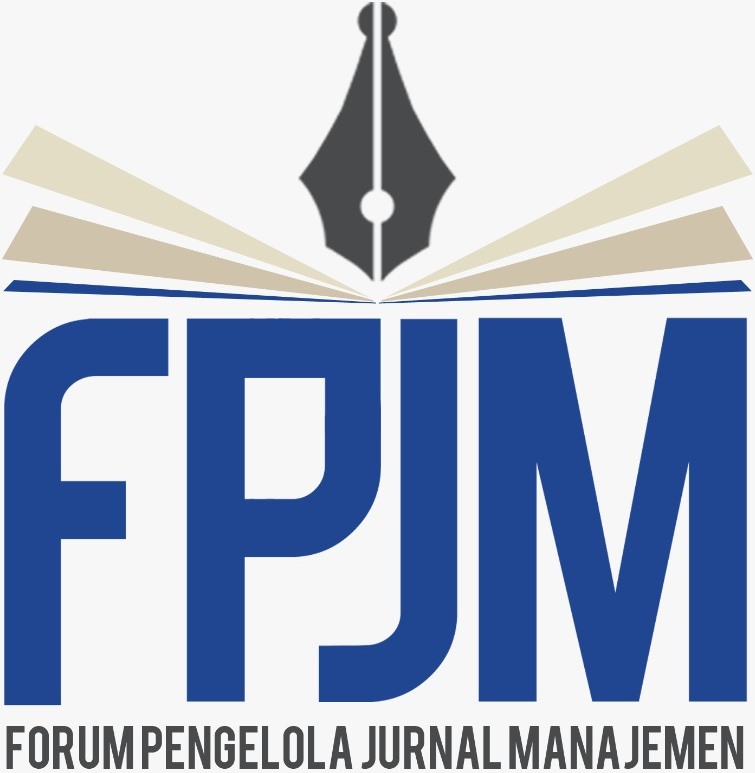PENGARUH KNOWLEDGE LEADERSHIP, KOMUNIKASI, DAN MOTIVASI TERHADAP KINERJA KARYAWAN PADA PT VALADOO INDONESIA
Abstract
Employee performance is considered important for organizations due to the success of an organization influenced by it. Job performance or achievement is the job result which accomplished by an employee in performing tasks according to the responsibility given to him. A common problem that must be considered in the company is related with job performance. Without good employees performance at PT Valadoo Indonesia, its excellence is not going to happen. One of the factors that can be used to improve the employees performance is knowledge leadership, communication and motivation. Leaders who have a good knowledge and experience will be able to improve the performance of employees in achieving the company's vision and mission. In carrying out the work, the employee can not be separated from communication with fellow co-workers, the boss and the subordinate. Good communication can be an appropriate means to improve employee performance. In addition to communication, it is also necessary if the motivation for employees with high work motivation usually has a peak performance. Therefore, the research aims to know what is the effect of knowledge of leadership, communication, and motivation on employee performance at PT Valadoo Indonesia either partially or simultaneously. The aim of the study is also to identify and analyze the effect of knowledge of leadership, communication, and motivation on PT Valadoo Indonesia employee performance. The theory used in this study is theories of human resource management, especially those related to knowledge leadership, communication, motivation, and performance of employees. Population used in this study is the employee of PT Valadoo Indonesia. Sampling technique used is simple random sampling. Method of data collection is using questionnaire data analysis that is Structural Equation Modeling (SEM) of Lisrel 8.7.
References
Antoni, F. (2006). Pengaruh Gaya Kepemimpinan Orientasi Tugas dan Orientasi Hubungan terhadap Motivasi Kerja dan Dampaknya pada Prestasi Kerja Pegawai Pengadilan Tinggi Tata Usaha Negara Surabaya. Tesis. Universitas 17 Agustus. Surabaya.
Behling, O. dan McFillen, Jaes M. (1996). A Syncretical Model of Charismatic/ Transformational Leadership, Group & Organisational ManagementVol 21.
Cangara, H. (2007). Pengantar Ilmu Komunikasi. Jakarta: PT. Raja Grafindo Persada.
Chang, S. C., & Lee, M. S. (2007). A study on relationship among leadership, organizational culture, the operation of learning organization and employees job satisfaction. The Learning Organization.
Dewi, Sutrisna. (2007). Komunikasi Bisnis. Edisi 1. Jakarta: C.V Andi Offset.
Effendy, Onong U. (2005). Ilmu Komunikasi, Teori dan Praktek. Bandung: PT Remaja Rosdakarya.
Ferdinand, A. (2002). Structural Equation Modelling Dalam Peneltian Manajemen. Edisi 2, Seri Pustaka Kunci 03/BP UNDIP.
Greger, Kenneth R. dan Peterson, John S. (2000). Leadership Profiles for the New Millenium Cornell Hotel and Restaurant Administration Quaterly.
Hair, et al. (2006). Multivariate Data Analysis, 5th Edition, New Jersey: Prentice Hall International, Inc.
Brahmasari, Ida A. dan Suprayetno, Agus. (2008). Pengaruh Motivasi Kerja, Kepemimpinan dan Budaya Organisasi Terhadap Kepuasan Kerja Karyawan serta Dampaknya pada Kinerja Perusahaan (Studi kasus pada PT. Pei Hai International Wiratama Indonesia), Jurnal Manajemen dan Kewirausahaan, Vol 10.
Larson, W Donald. (2008). Knowledge Leadership. Tersedia di http://www.timeoutofmind.com/pdf/keynote/knowledge_leadership.pdf
Luthans, F. (2006). Perilaku Organisasi. Yogyakarta: Penerbit Andi.
Mangkunegara, Anwar P. (2005). Evaluasi Kinerja SDM. Bandung: Refika Aditama.
______________________. (2000). Manajemen Sumber Daya Manusia. Bandung: Penerbit Remaja Rosdakarya.
MasÃud, F. (2004). Survai Diagnosis Organisasional Konsep & Aplikasi. Semarang: Badan Penerbit Universitas Diponegoro.
Mathis, R. dan Jackson, J. (2001). Manajemen Sumber Daya Manusia. Terjemahan Jimmi Sadili dan Bayu. Jakarta: Salemba Empat.
Mulyana, D. (2005). Ilmu Komunikasi Suatu Pengantar. Bandung: Remaja Rosdakarya.
Robbins, Stephen P. (2003). Perilaku Organisasi Jilid 2. Jakarta: Indeks.
Robbins, Stephen P. dan Timothy A. Judge. (2008). Perilaku Organisasi Edisi ke-12. Jakarta: Salemba Empat.
Rosjidan. et al. (2001). Belajar dan Pembelajaran. Malang: Universitas Negeri Malang.
Siagian P. Sondang. (2002). Kiat Meningkatkan Produktivitas Kerja. Jakarta: Rineka Cipta.
Sardiman, A.M. (2007). Interaksi dan Motivasi Belajar Mengajar. Jakarta: PT Raja Grafindo Persada.
Silalahi, U. (2002). Pemahaman Praktis Asas-asas Manajemen, Cetakan kedua. Bandung, Mandar Maju.
Sugiyono. (2010). Metode penelitian Kuantitatif Kualitatif dan R&D. Bandung: Penerbit ALFABETA.
Sunarcaya, P. (2008). Analisa Faktor-faktor yang mempengaruhi Kinerja Pegawai diLingkungan Dinas Kesehatan Kabupaten Alor NTT. Jakarta: Universitas Terbuka.
Sumarsono, S. (2003). Ekonomi Manajemen Sumber Daya Manusia dan Ketenaga kerjaan. Jogyakarta: Graha Ilmu.
Solimun. (2002). Multivariate Analysis Structural Equation Modelling (SEM) Lisrel dan Amos. Malang: Fakultas MIPA Universitas Brawijaya.
Viitala, R. (2004). Towards knowledge leadership. Leadership & Organization Development Journal, Vol. 25.
Wayne, R. Pace dan Don F. Faules. (2005). Komunikasi Organisasi. Bandung: PT Remaja Rosdakarya.
Wiryanto. (2004). Pengantar Ilmu Komunikasi. Jakarta: PT Grasindo.
DOI: 10.34203/jimfe.v4i1.1103
Refbacks
- There are currently no refbacks.
Copyright (c) 2019 JIMFE (Jurnal Ilmiah Manajemen Fakultas Ekonomi)

This work is licensed under a Creative Commons Attribution-NonCommercial-ShareAlike 4.0 International License.











